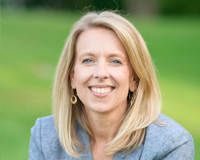Sen. Cohen Named “2021 Legislator of the Year” By the CT Farm Bureau for Her Work on Connecticut Agriculture and Aquaculture
HARTFORD – State Senator Christine Cohen (D-Guilford) has been named the “2021 Legislator of the Year” by the Connecticut Farm Bureau for her work in passing legislation that allows for continuity and expansion of the state’s rich tradition in agriculture and props up small businesses that are our farms across Connecticut.
Besides important updates to statutes pertaining to hemp growth, ensuring that the Community Investment Act maintains vital funding and scaling-up the Farmer’s Market Nutrition Program, Sen. Cohen led bills that allow for the siting of anaerobic digesters on farms – which turn animal waste and food scraps into a usable biogas – and one that redefines ”farmland” under state law to include underwater farmlands used for aquaculture, reducing local property tax bills for farmers.
Sen. Cohen is Senate Chair of the Environment Committee, which has cognizance over matters relating energy, conservation, recreation, pollution control, fisheries and game, state parks and forests, water resources and flood and erosion control, farming, dairy products and domestic animals.
The Connecticut Farm Bureau is the state’s largest and oldest agricultural organization, with more than 3,000 members around the state who advocate for agriculture and farmers and work to preserve Connecticut’s rural landscape.
Sen. Cohen’s award was given at last week’s annual Connecticut Farm Bureau meeting, which was conducted online.
“Christine Cohen is dedicated to making farms and farming better in Connecticut, as evidenced by her hard work in passing new laws that can make our farmlands more profitable and more productive and for bringing Connecticut’s healthy aquaculture industry into the 21st Century with a common-sense change in the state definition of farmland to include offshore oyster beds and other underwater farming,” said Connecticut Farm Bureau Executive Director Joan Nichols. “Connecticut farmers have a real champion in Senator Cohen, and we are proud to recognize her with this year’s Legislator of the Year Award.”
“Growing up in Connecticut, and living by the shore, I have a real appreciation not just for the beauty of our farmland here in Connecticut, but also for the role that farming plays in maintaining a clean and safe environment and keeping us nourished,” Sen. Cohen said. “I’m honored to have received the Legislator of the Year Award from the Connecticut Farm Bureau. They are an organization whose advocacy for Connecticut agriculture I deeply admire, and together we were able to pass numerous pieces of legislation this year to support Connecticut’s diverse, vibrant and ever-growing agricultural economy. They are a valuable and tireless partner in achieving legislative success, and I want to thank each and every member of the Connecticut Farm Bureau for their tireless support on behalf of the agriculture community. I look forward to continuing our work together.”
The Connecticut Farm Bureau cited two prominent bill proposals that were deciding factors in presenting this year’s award to Sen. Cohen. They were:
- Senate Bill 930, “AN ACT CONCERNING FOOD WASTE DIVERSION AND ANAEROBIC DIGESTION FACIITIES” and House Bill 6503, “AN ACT CONCERNING THE SITING OF ANAEROBIC DIGESTION FACILITIES ON FARMS.” These bills encourage the siting and permitting of anaerobic digesters. In 2015 – the last time the Connecticut Department of Energy and Environmental Protection conducted a statewide waste characterization study – food waste from homes and businesses nearly equaled paper waste as the largest percentage of all trash: 22.3% food waste versus 23.1% paper waste. There’s twice as much food waste than plastic or construction debris in our garbage trucks, six times more than metal and nine times more than glass. Food waste is very heavy and absent separation, incredibly costly to haul. Food waste is the fastest-growing segment of Connecticut’s solid waste stream, but it’s also the largest portion of waste that can be recycled. Additionally, we have cattle farmers in Connecticut that see a significant amount of methane release due to manure production. Instead of releasing the environmentally dangerous methane to our atmosphere, farmers can harness the gas and use it for energy production. Anerobic digestion facilities can turn food and animal waste to a methane-rich biogas, which can be used to generate heat, create electricity, or fuel vehicles.
-
Senate Bill 840, “AN ACT CONCERNING CONNECTICUT’S SHELLFISH RESTORATION PROGRAM AND THE CONNECTICUT SEAFOOD COUNCIL,” which re-defines the state’s definition of “farmland” to include underwater farmlands used for aquaculture. This would allow shellfish and seaweed farmers to take advantage of Connecticut’s Public Act 490 law, passed in 1963, and have their underwater shell fishing beds and “maritime heritage land” assessed at their ‘use’ value, rather than their ‘fair market’ value, which would result in lower annual local property taxes. Connecticut’s shellfish industry has more than 70,000 acres under cultivation, generates in excess of $30 million in sales annually and employs 300 jobs statewide. The bill will expand the Shellfish Restoration Program and reconstitute the Connecticut Seafood Development Council in order to better promote Connecticut seafood products and examine market opportunities.
